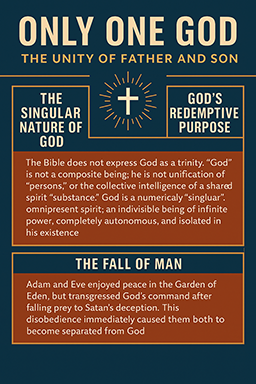Article
Search Articles
Listen
Download Article Study Sheet
Get the study sheet to review the highlights of this article.
Download SummaryRelated Articles
Get The Infographic
Get the full sized infopgraphic overview highlighting the key points discussed in this article.
Download Now
Only One God: The Unity of Father Son - The Biblical Truth of Divine Unity and Human Redemption
 Loading author...
Loading author...

The Singular Nature of God
The bible does not express God as a trinity. "God" is not a composite being; he is not the unification of "persons", or the collective intelligence of a shared spirit "substance." God is a numerically "singular", omnipresent spirit; an indivisible being of infinite power; completely autonomous, and isolated in his existence.
Unfortunately, many profess belief in a "God" that is multiplicitous in person, essence or being; explained as three divergent, yet consolidated, self-aware entities or "personalities"; referenced as "Father", "Son" and "Holy Spirit." Nevertheless, God himself states that there is only one God; not ordinal in any manner.
Despite the unambiguous declarations of God about himself (Deuteronomy 6:4, Deuteronomy 32:39, Isaiah 45:5-6, Nehemiah 9:6), many doctrines still attempt to profile God "above" his own classification. As humankind, we are no more capable of "profiling" God than a family pet is capable of "profiling" its owner; we of course have some peripheral knowledge of God just as the family pet has peripheral knowledge of its owner, because God has revealed some of himself to us. However, any conclusion we reach about God that is not derived from God's word or spirit (confirmed by his word) is a clear indication that we have already veered down the road of error.
The marginal understanding we have of God is enough to occupy our minds for a lifetime. It is futile at best and impossible at worst to attempt an objective analysis of God; whereby mankind "discovers" the characteristics and predictability of God "apart" from God. We glean who and what God is from the breadcrumbs he has dropped for us to follow (Romans 1:19-20).
God expresses his existence as an individual being. We read in Isaiah 46:9-10:
"Remember the former things of old: for I am God, and there is none else; I am God, and there is none like me, Declaring the end from the beginning, and from ancient times the things that are not yet done, saying, My counsel shall stand, and I will do all my pleasure:"
This declaration leaves no room for ambiguity. God is not speaking as one member of a divine committee or as one aspect of a multi-faceted being. He is declaring his absolute uniqueness and singularity. When God says "there is none else" and "there is none like me," he is establishing his identity as the one and only God—not one of three, not one in three, but one, period.
God is eternal; he has always existed and will always exist (Psalm 90:2). The same cannot be said for the "Son" of God, the physical body God inhabited, which did not always exist (Luke 1:30-35). This distinction is crucial: while God himself is eternal, the physical manifestation he would inhabit as the Son had a beginning point in time. The basis for a "son" begins with sin, though it actually began before sin—not in a "person" but in God's omniscient plan of redemption.
The Perfect Beginning and the Fall
As difficult as it is to imagine, this world began its existence as a serene paradise; completely free of any adverse entanglements. God created man and woman in a state of perfection, gave them habitation and purpose in the garden of God (Genesis 2:15). The freedom man and woman enjoyed in the garden came with a single caveat; not to eat from the tree of "knowledge of good and evil."
For a time, both Adam and Eve clung to this edict and obeyed his command. However, at some point, our first ancestors decided (inspired by Satan of course) that God didn't really mean what he said. The temptation came through deception, as we read in Genesis 3:1-6:
"Now the serpent was more subtil than any beast of the field which the Lord God had made. And he said unto the woman, Yea, hath God said, Ye shall not eat of every tree of the garden? And the woman said unto the serpent, We may eat of the fruit of the trees of the garden:"
"But of the fruit of the tree which is in the midst of the garden, God hath said, Ye shall not eat of it, neither shall ye touch it, lest ye die. And the serpent said unto the woman, Ye shall not surely die: For God doth know that in the day ye eat thereof, then your eyes shall be opened, and ye shall be as gods, knowing good and evil."
"And when the woman saw that the tree was good for food, and that it was pleasant to the eyes, and a tree to be desired to make one wise, she took of the fruit thereof, and did eat, and gave also unto her husband with her; and he did eat."
Satan's attack was strategic and devastating. He emerged seeking to disrupt and destroy the order God created. His attack against the first man and woman was primarily an attack against God himself whom he could not attack directly. His hatred of God inspired him to undermine man, through the woman, and seize authority over all the earth (Luke 4:5-6, John 14:30, 2 Corinthians 4:4) just as he had lost his place in heaven attempting to seize authority from God (Isaiah 14:9-12, Ezekiel 28:9-12).
The world we see today bears the marks of this cosmic rebellion. Although man is still the principal means by which the world advances (or degrades), man is heavily subject to the influence of Satan; man's motives are no longer driven by godly pursuits, but by greed, a lust for power, and the desire to control the destiny of man, completely liberated from the control of God. We need look no further than the current state of the world and the direction it is headed to see the evidence of this spiritual corruption.
The Deception and Its Consequences
Satan could not simply take control of what God had given man. Seizing control from man required his consent (Romans 6:12-14). Apparently, Satan could not deceive Adam directly, but instead approached Eve. Satan purposed to seduce Eve into replicating his mistake. He instigated Eve's desire to excel "beyond" the limits given to her (Genesis 3:5-6). Just as Satan became dissatisfied with the position God had given him (a very high one), Eve too became dissatisfied with her role in God's creation and sought something higher; so, she took from the tree and ate. Adam, apparently having the same desire, also ignored the command of God and followed his wife into disobedience.
This doesn't suggest Eve is "more blameworthy" than Adam; in fact, it is just the opposite. God instructed Adam not to eat from the tree directly, it was his responsibility to carry God's edict to Eve; which we know he did because Eve stated it to the serpent. However, she is now carrying Satan's words to Adam; he briefly considers them and succumbs. Adam could have remained steadfast in God's command, despite the disobedience of his wife, but he opted to freely ignore the words of God. When punishment was handed down, God stated Adam's violation saying; "Because you have harkened unto the voice of your wife..."
Adam was NOT deceived as Eve was (1 Timothy 2:14); so Adam is more blameworthy than Eve, as he, through disobedience, brought sin into the human family (Romans 5:12). Nevertheless, just as Lucifer, Adam, and Eve desired "more" than what God gave them, and attempted to pursue advancement "beyond" God, their efforts only succeeded in their destruction.
The consequences were immediate and eternal. As a result of disobeying God, Adam and Eve were ejected from the Garden as Satan had been ejected from Heaven. Adam, Eve and all of their descendants would now experience physical death. Not only would man and woman now die physically (eventually), but their holy nature was corrupted and they died spiritually (immediately as sin was now part of the human psyche); humankind was now destined for eternal separation from God.
That was the fate of man following his own desires—eternal death and separation from the source of all life and goodness.
The Promise of Redemption
However, this is not the route God would choose for us. Through an unfathomable love for his fallen creation, God opted to dismantle the objective of Satan by providing a reprieve for man and his destiny of eternal separation. The first prophecy of this work is found in Genesis 3:15:
"And I will put enmity between thee and the woman, and between thy seed and her seed; it shall bruise thy head, and thou shalt bruise his heel."
In this verse, the bible reveals God's promise of redemption; that is, the prophecy of God himself coming to ransom humankind from the sentence of eternal death passed down to all through Adam. This promise was not an afterthought or a plan B—it was the eternal plan of the one eternal God, who in his omniscience knew before the foundation of the world what would transpire and how he would respond.
The promise is both simple and profound: the same God who created man, the same God who walked with man in the garden, the same God who pronounced judgment upon man's disobedience, would also be the God who would provide the way back. Not through a separate person or entity, but through his own direct intervention in human history.
This redemption would require God to take on human flesh, to experience the limitations and sufferings of humanity, and to provide the perfect sacrifice that justice demanded. The eternal God would enter time, the infinite would become finite, the immortal would taste death—all to restore the relationship that was broken in the garden.
The biblical narrative presents a clear and consistent picture: one God, one creation, one fall, one promise of redemption. The complexity that men have added to this simple truth through doctrines of multiple persons or divine committees finds no support in the plain declarations of Scripture. God himself declares his singularity, his uniqueness, his absolute sovereignty over all creation and redemption.
The story of redemption is not about negotiations between divine persons or the satisfaction of competing interests within the Godhead. It is about the one true God, moved by love for his fallen creation, providing a way back to himself. The means and methods of this redemption reveal not a divided God but a unified purpose flowing from the heart of the one who is both Creator and Redeemer, both Judge and Savior.
As we examine how God executed his plan of redemption, we find that every aspect points back to the same singular truth: there is one God, and beside him there is no other. In him we live and move and have our being, and in him alone we find our redemption.
Tags: